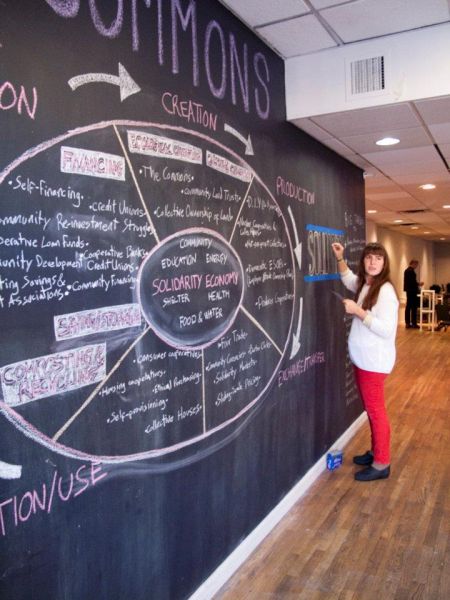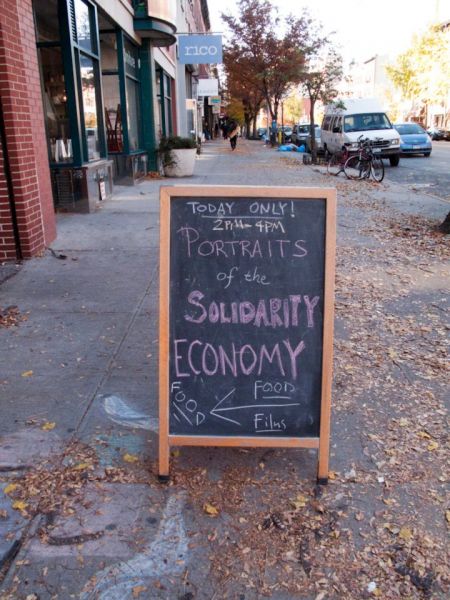See also: part two, The Occupation of Workplace Democracy: Challenges and solutions for a solidarity economy.
SolidarityNYC is a New York City-based group which works to create links between social movements and the "solidarity economy." The latter consists of cooperatives, small businesses, non-profits and other economic activities which "reinforce values of justice, ecological sustainability, cooperation, and democracy." The group aims to promote the solidarity economy as an alternative to the "competition and hierarchy which characterize corporate capitalism."
Much of SolidarityNYC's recent work has centred around Occupy Wall Street, where many of its members have been active. Through their "Occupy Workplace Democracy" event and other activities, SolidarityNYC has worked to "challenge the social justice movement to take up grassroots economic community development" as a way of building solidarity and concrete alternatives to capitalism.
Cheyenna Weber of SolidarityNYC answered questions via email. More information about the group can be found on their web site and facebook page.
Can you talk a bit about your own background in organizing, and how SolidarityNYC got started?
SolidarityNYC grew out of a desire to organize the positive solutions-oriented forms of anti-capitalist resistance that are often overlooked by the social justice movement and the larger public. When we got started I'd been organizing students to change the way their schools invested, which is a long term dual strategy of corporate subordination and wealth redistribution, and I was really burnt out by the limited forms of change we could make and by the negative thrust of our work. By then I'd been involved in corporate campaigns for many years and I'd grown used to always striking against corporate power in defense. The solidarity economy demonstrated to me it is possible to build something resilient, beautiful, and life affirming that also strikes very direct blows at capitalism and oppression. This was important to me because of my background--I grew up in West Virginia surrounded by extreme inequality and many forms of violence. I had struggled with a deep and self-destructive sadness and anxiety from that experience, and I wanted my life to be organized not on negative terms of merely easing suffering but in positive terms of meeting violence and oppression with love and affirmation. I wanted to build rather than just tear down all the time. In 2009 I met a couple of people who were interested in something similar, in large part due to the U.S. Solidarity Economy Network, and by 2011 we formalized into the collective that currently exists.
What is an example of solidarity economy-building that has been inspiring to you, and how you see it fitting into a broader anti-capitalist resistance?
In NYC one of the strongest examples is the Ganas community of Staten Island. At Ganas all members pay dues to cover the expenses of the community. Some of them do so by working jobs outside Ganas (most of the 80 people living there work in Manhattan) and then paying the equivalent of rent, while others work within the community either in the houses (cleaning, cooking, stocking) or in one of the three businesses Ganas operates. Some create a combination of the two. The businesses are located within close range of the ferry and the houses are situated at the top of a hill amid dense flower and vegetable gardens. While Ganas members don't necessarily identify their community and shared livelihood as anti-capitalist, I certainly see it as one type of cooperative that is led by values rather than profit motives. The whole point of the businesses is to provide income for members, though because they've focused on used furnishings and clothing they've also managed to salvage tons of stuff that would otherwise go to the landfill, thus practicing their values of ecological concern and stewardship as well. Efforts like Ganas are not always at the forefront of our thoughts when we consider anti-capitalism, which often conjures images of Black Bloc style direct action, and that's part of why I consider it so inspiring. They didn't set out to destroy the system. They just built something smart, intentional, and successful with their values and needs as the guiding force. Of course if I set up something similar I would want to highlight it as anti-capitalist and create stronger ties to the social justice movement, but if we all set up similarly secure communities I'm not sure that we'd need the same kind of movement we're so desperate for today.
Here in Quebec, we have a relatively large cooperative sector, and the government supports it to some extent, seeing it as part of a mixed economy; cooperatives often fill the niches where for-profit businesses don't see a big enough opportunity for profit. Do you think it's possible for the social economy to move from this kind of a comfortable niche role to challenging the basic ideas behind the economic system, to be an anti-capitalist force in and of itself? What do you see as being the next step in that direction?
I do believe it is possible. In the U.S. we'd have to start by grounding our cooperation in liberation struggles in our communities and creating symbiotic relationships with those engaged in social change. Some co-ops do this already and others are apolitical, of course, and there is plenty of work to do in between. I can definitely see a co-op movement, which was prefigured by the Movement for a Free Society's food co-ops in the U.S., that exists to create livelihoods for communities engaged in social change. One of the biggest obstacles to anti-capitalist organizing is the non-profit industrial complex and the ways our work is funded and shaped by a professional social change sector dependent on grant money. Co-ops could help meet the immediate needs organizers have as humans (food, money, housing, etc.) in ways that would free us to organize in creative ways outside the existing nonprofit structure. This would also allow us to bring folks into the struggle who are currently marginalized by our increasingly professionalized sector. When we actually meet needs as part of our efforts to create social change we also engage in making the resistance irresistible and building functional and effective communities. Now is a good time for this attempt to bring radicalized leadership to the co-op movement because right at the moment when young people are looking to "alternatives" we have an aging leadership that is looking to retire. Co-ops are set up to be anti-capitalist, in my mind, because of the principle of cooperation among cooperatives, which would allow us to build a robust solidarity economy together that meets needs and holds our interdependence at the center.
Solidarity NYC has the objective of challenging the social justice movement "to take up grassroots economic community development." How do you do that?
The solidarity economy is a relatively new concept in the U.S. despite its success in Latin America, Europe, and Canada. We're a small volunteer collective and we've felt our best option is to first lift up what is already happening and connect people to each other. We've created a map of NYC's solidarity economy (and we're working to create additional functions, such as a directory, that will make it very easy to use) and we partnered with the Brooklyn Filmmakers Collective to create a series of short films profiling solidarity economy models and practices. We've connected people through events at times, but most of our movement building has focused on creating new relationships among solidarity economy practitioners themselves and between them and the new folks who are new interested in these ideas. Thanks to the Occupy movement many people are now interested in solidarity economics and we're increasingly given opportunities to connect across generations, sectors, and communities. We also keep a pretty busy schedule participating in events where we can engage those within the movement directly. We're hoping this spring to begin to more directly bring NYC's solidarity economy into the mobilizations planned by Occupy Wall Street and others.
With regard to your work around Occupy Wall Street in particular, what do you see as the main challenges or obstacles when it comes to encouraging people to build a solidarity-based economy?
OWS is a fluid and chaotic space that has been both limited and liberated by its focus on the tactic of occupation. What's wonderful is that it has rekindled the radical imagination and people are now open and willing to consider alternatives that they might formerly have considered unrealistic, so it has already helped us surmount one of our chief obstacles: cynicism. One of the challenges has been sustaining relationships under the pressures particular to the NYC General Assembly, which I understand as particularly intense due to the nature of our action and role in the movement. Another issue has been vanguardism and a strong suspicion of organizations which existed prior to OWS that might want to co-opt the movement. We've worked hard to build relationships to working groups and to participate in both mobilizations and governance as appropriate to our needs and capacity as a way to combat this fear.
On the campaign side we've learned that when the task is concrete and only one step, such as moving one's money to a credit union, the messaging and mobilization is much easier than when we work with groups who would take on deeper commitments, such as a starting a worker co-op. Perhaps most importantly, most solidarity economy practices and models are based on relationships, trust, and a strong desire or concern for interdependence. That kind of connection between people takes time to build and we're still too new as a movement (only 6 months old!) to have the strong bonds we need to create new solidarity economy institutions on a large scale. We have had some success supporting the start of small efforts, such as the OccuCopy worker co-op, but there are many others we haven't yet seen fully emerge. I believe we can access money and expertise fairly easily but we won't be able to build anything until people trust each other and our affinity groups/working groups/organizations are stable.
There is plenty to be done to support the existing institutions and initiatives but there we must also be careful because those people often have relationships to power that have been years in formation. We don't want to hurt that which we seek to support and we're still learning how OWS groups can best serve as allies to those who have been building a solidarity economy for decades in this city. Similarly, many of the existing groups are run by older folks who don't fully understand how to engage with the tactics of OWS and the young people involved, so we've been active in helping to bridge that gap through events like Occupy Workplace Democracy, which brought together worker owners and co-op experts to meet with OWS groups who need nuts and bolts support, and from directly connecting people in our network to each other. It is slow but we have seen progress.
See also: part two, The Occupation of Workplace Democracy: Challenges and solutions for a solidarity economy.
* * *
Dru Oja Jay (the interviewer) is a Montreal-based writer and organizer. He is co-author of the forthcoming Paved with Good Intentions: Canada's development NGOs from idealism to imperialism.






